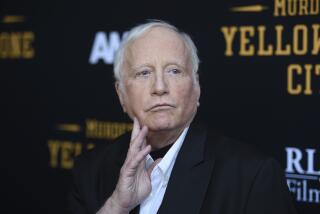How do you apologize when accused of sexual misconduct? In Hollywood, it runs the gamut

As the number of men accused of sexual harassment and misconduct continues to increase, so do the ways in which the industry, and the accused, respond.
Traditionally, this is the time of year when Hollywood practices its acceptance speeches; instead many high-profile members of the entertainment industry have been perfecting their apologies.
As the number of men accused of sexual harassment and misconduct continues to increase, so do the ways in which the industry, and the accused, respond. Where it took a week for Harvey Weinstein to be ousted from his company after he was accused by multiple women in the New York Times and the New Yorker, Pixar’s John Lasseter was put on leave and “Today’s” Matt Lauer fired before any accusations were made public.
The men’s responses have varied. Some, including Brett Ratner, James Toback, Ed Westwick and Jeremy Piven, have simply denied all charges, and Weinstein denies allegations of rape. But most have issued some form of public apology, whether for specific acts or for any misunderstanding or harm that they might have unintentionally caused.
The denials often prompted more women and men to come forward with new allegations, and the apologies have not fared much better, perhaps because they have shared certain notes. The apologia chorus:
Show respect
Harvey Weinstein: “I so respect all the women and regret what happened.”
Kevin Spacey: “I have a lot of respect and admiration for [accuser] Anthony Rapp as an actor.”
Dustin Hoffman: “I have the utmost respect for women and feel terrible that anything I might have done could have put [a former intern] in an uncomfortable situation.”
Sen. Al Franken: “While I don’t remember the rehearsal for the skit as [my accuser] does, I understand why we need to listen to and believe women’s experiences.”
Russell Simmons: “This is a time of transition. The voices of the voiceless, those who have been hurt or shamed, deserve and need to be heard.”
Profess ignorance
Simmons: “I mean no disrespect to [accuser Tanya Reid] at all when I say I honestly do not recall my telephone conversation with a hotel front desk clerk from over a quarter century ago.”
Franken, in his first apology: “I certainly don’t remember the rehearsal for the skit in the same way, but I send my sincerest apologies to Leeann [Tweeden, his first accuser].”
Spacey: “I honestly do not remember the encounter, as it would have been over 30 years ago.”
Generally express remorse
Lauer: “There are no words to express my sorrow and regret for the pain I have caused others by words and actions.”
Louis C.K.: “I have been remorseful of my actions. And I’ve tried to learn from them. And run from them. Now I’m aware of the extent of the impact of my actions. … The hardest regret to live with is what you’ve done to hurt someone else. And I can hardly wrap my head around the scope of hurt I brought on them.”
Weinstein: “I cannot be more remorseful about the people I hurt and I plan to do right by all of them.”
Franken, in his second apology: “I feel terribly that I’ve made some women feel badly and for that I am so sorry, and I want to make sure that never happens again.”
Lasseter: “I especially want to apologize to anyone who has ever been on the receiving end of an unwanted hug or any other gesture they felt crossed the line in any way, shape, or form.”
Promise to change
Weinstein: “Though I’m trying to do better, I know I have a long way to go. That is my commitment. My journey now will be to learn about myself and conquer my demons. Over the last year I’ve asked Lisa Bloom to tutor me and she’s put together a team of people. I’ve brought on therapists and I plan to take a leave of absence from my company and to deal with this issue head on.”
Lasseter: “My hope is that a six-month sabbatical will give me the opportunity to start taking better care of myself, to recharge and be inspired, and ultimately return with the insight and perspective I need to be the leader you deserve.”
C.K.: “I have spent my long and lucky career talking and saying anything I want. I will now step back and take a long time to listen.”
Lauer: “Repairing the damage will take a lot of time and soul searching and I’m committed to beginning that effort. It is now my full-time job.”
Franken, in his fourth apology: “I’m going to try to learn from my mistakes. In doing so, I’ve been doing a lot of reflecting. I want to be someone who adds something to this conversation.”
Charlie Rose: “All of us, including me, are coming to a newer and deeper recognition of the pain caused by conduct in the past, and have come to a profound new respect for women and their lives.”
Try to explain
Weinstein: “I came of age in the ’60s and ’70s, when all the rules about behavior and workplaces were different. That was the culture then. I have since learned it’s not an excuse, in the office — or out of it.”
C.K.: “At the time, I said to myself that what I did was OK because I never showed a woman my [penis] without asking first, which is also true. But what I learned later in life, too late, is that when you have power over another person, asking them to look at your [penis] isn’t a question. It’s a predicament for them.”
Franken: “Coming from the world of comedy, I’ve told and written a lot of jokes that I once thought were funny but later came to realize were just plain offensive.”
Rose: “I always felt that I pursued shared feelings, though I now realize that I was mistaken.”
Simmons: “While I have never been violent, I have been thoughtless and insensitive in some of my relationships over many decades and I sincerely and humbly apologize.
But then also change the subject
Weinstein: “I am going to need a place to channel that anger so I’ve decided that I’m going to give the NRA my full attention.… I’m making a movie about our President … One year ago, I began organizing a $5-million foundation to give scholarship to women directors at USC. While this might seem coincidental, it has been in the works for a year. It will be named after my mom and I won’t disappoint her.”
Spacey: “This story has encouraged me to address other things about my life. … I have loved and had romantic encounters with men throughout my life, and I choose now to live as a gay man.”
And don’t count on help from Geraldo Rivera:
After calling the news industry “flirty” in the wake of Lauer’s firing: “Reaction to my tweets today on #sexharassment makes clear I didn’t sufficiently explain that this is a horrendous problem. … I humbly apologize.”
After being then called out by Bette Midler for groping her in the 1970s: “Although I recall the time @BetteMidler has alluded to much differently than she, that does not change the fact that she has a right to speak out & demand an apology from me, for in the very least, publically embarrassing her all those years ago. Bette, I apologize.”
More to Read
The biggest entertainment stories
Get our big stories about Hollywood, film, television, music, arts, culture and more right in your inbox as soon as they publish.
You may occasionally receive promotional content from the Los Angeles Times.











